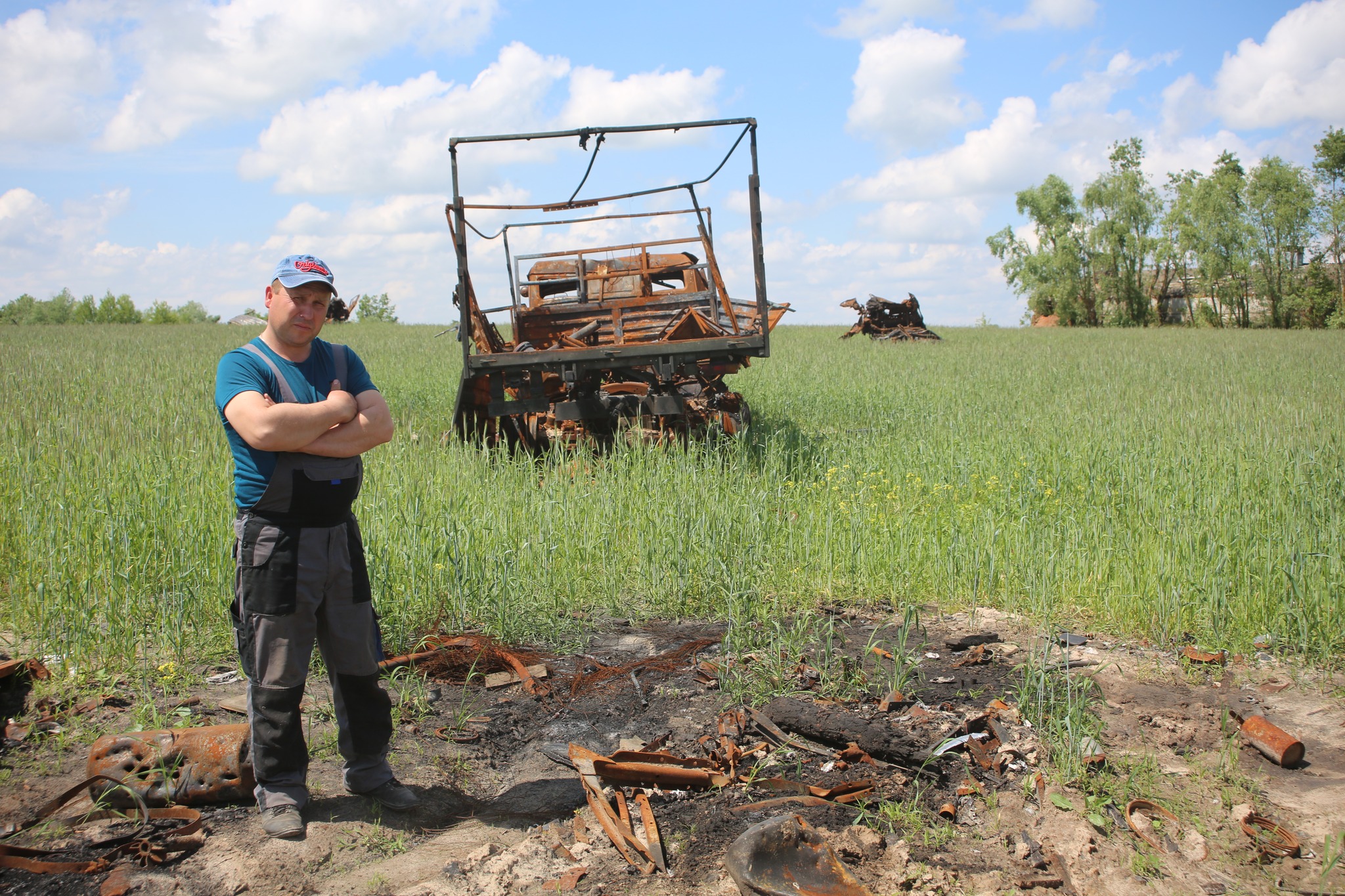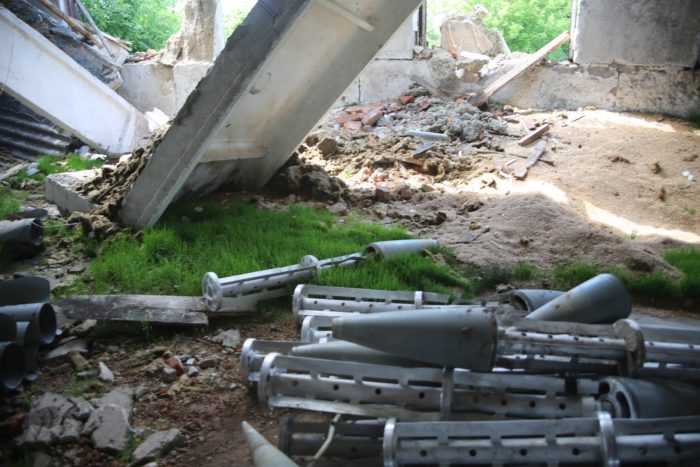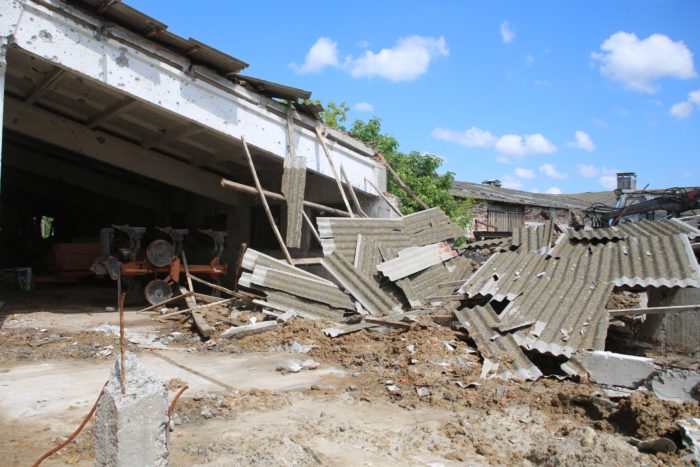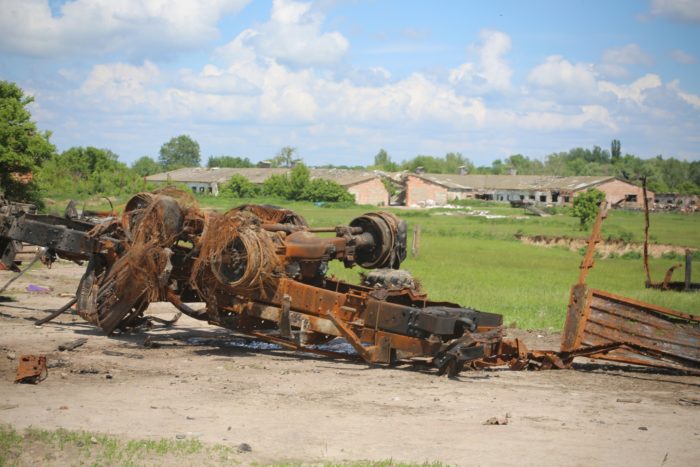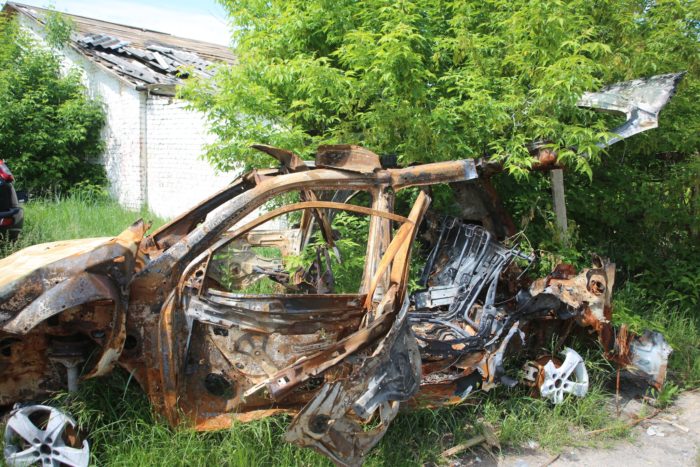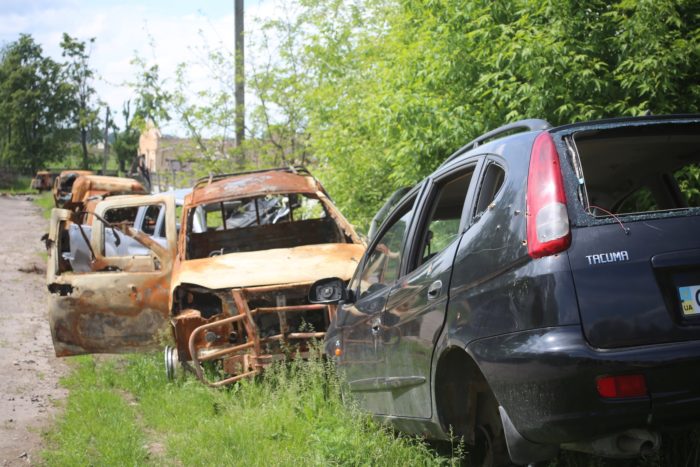As the Russian soldiers occupied villages of Chernihiv Oblast, they locked up nearly 400 people, including kids and infants, in a basement and fed them with dry galettes from their rations while eating the villagers’ meat, cheese, pigs, and even dogs. They banned villagers from using phones, threatening to shoot every third local if they find one, abducted girls, killed 60 cows on a single farm, and beat the local villagers for living too well because they put chickens in a “house.” Euromaidan Press (EP) reports from the site to expose Russian war crimes in Ukraine.
The Yahidne village: the torture site in Chernihiv Oblast
The village of Yahidne is located on a highway 10 kilometers south of Chernihiv. It has gained notoriety as a torture site, where Russian soldiers transported locals from the surrounding villages. In particular, Russians held captive 377 people in the village’s school basement for almost the entire March.
Here in Yahidne, the Russian forces maintained a stronghold until 30 March, when the Ukrainian troops expelled them. The Russians arrived here from the village of Shestovytsia located to the west of Yahidne, Chernihiv volunteer Roman Movchan says, with a part of these forces continuing towards Kyiv and another part staying in Yahidne to block the way to Chernihiv.
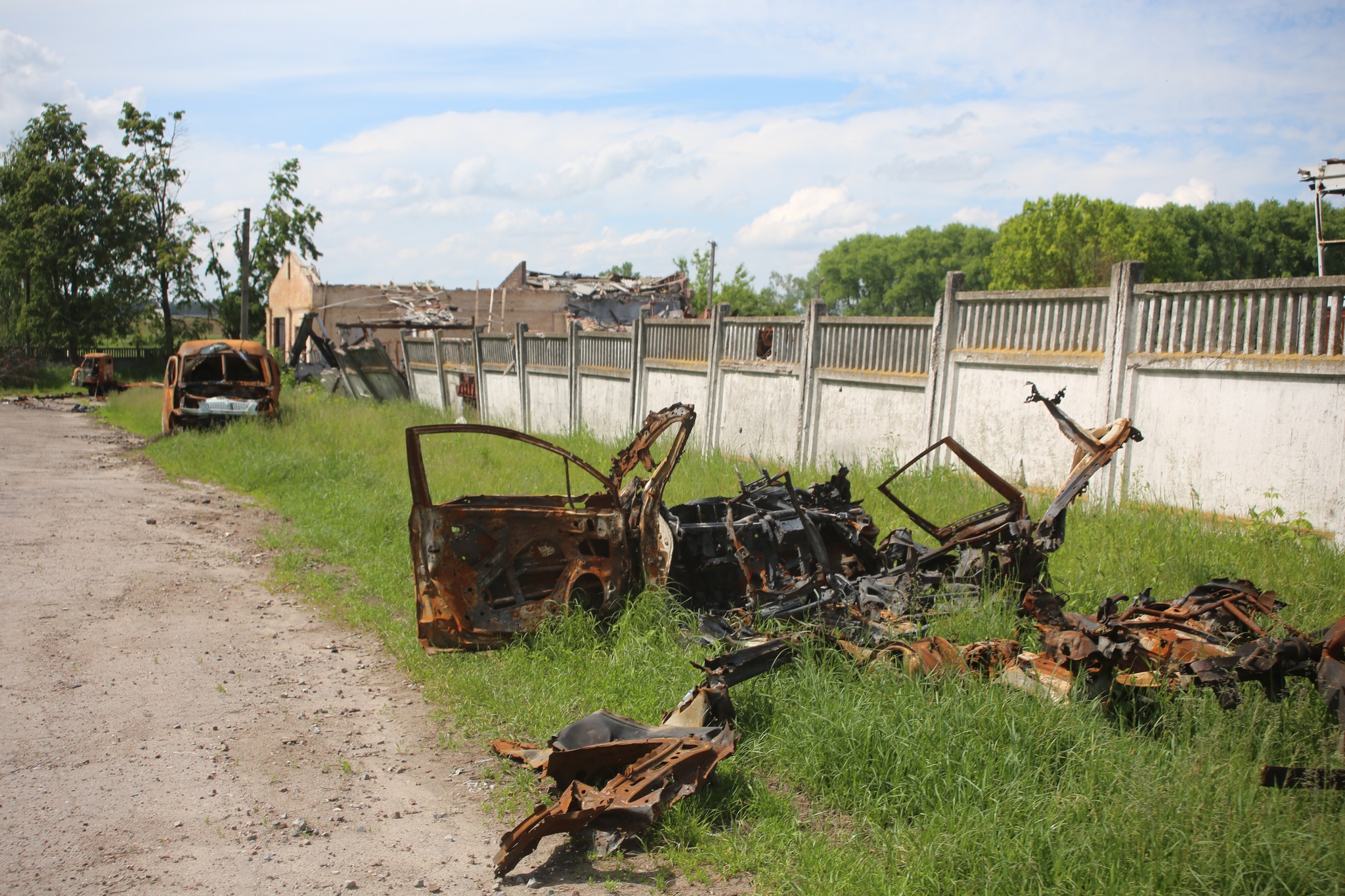
Two months after Ukrainian forces had liberated Yahidne, EP entered the village to find it littered with burned and crushed vehicles, piles of debris, shattered warehouses, and razed buildings everywhere. Four men were standing near the former collective farm, trying to clean something.
“They [Russians] entered the village on 3 March, and fighting was ongoing for several days,” one of the men told us. “They were afraid to come here at first while ours [Ukraine’s Armed Forces (AFU)] were here. And then the air force hit a roadblock and a [Ukrainian] tank. After that, [the Russians] started moving further towards Ivanivka.”
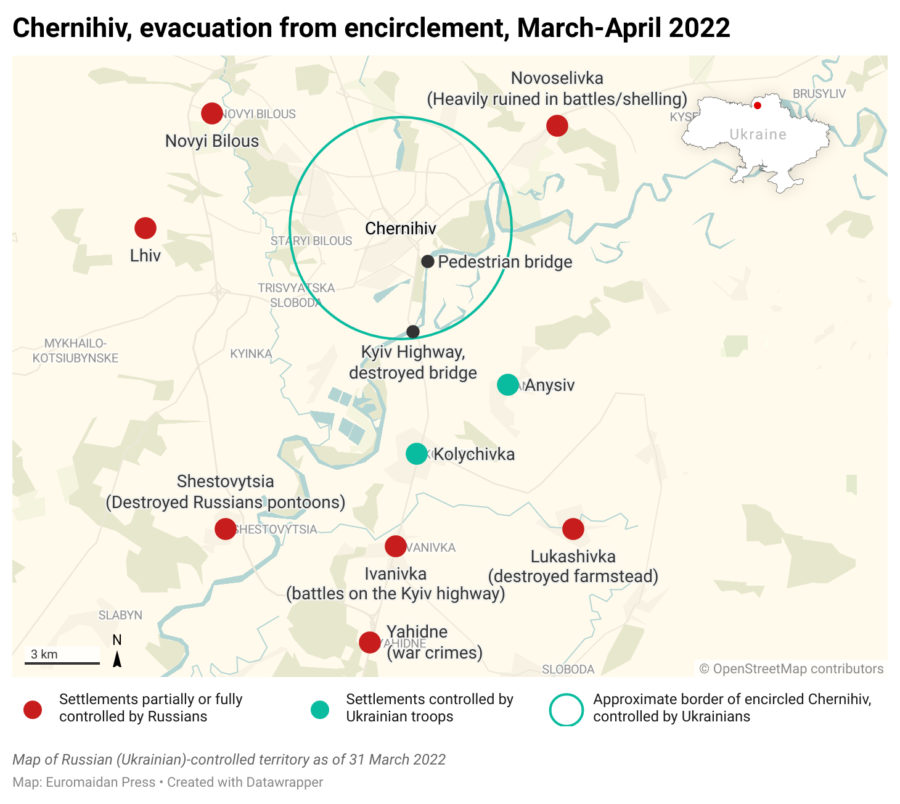
The man told us that he was originally from Yahidne. “From the first day they came, I stayed in the basement [till 30 March]. I turned on the boiler at school just as they arrived and stayed in the basement. I sat there with all of Yahidne’s [residents], and not only.”
When we asked if he had heard of any cases of torture, the man replied, “I saw it… And I experienced it myself.”
“Can you tell us about it?” we asked him.
“No, it’s disgusting. I don’t want to remember. My son served earlier [in the Ukrainian Army], and occupying forces found his uniform. They beat us. It’s good that at least one decent person was there, and we remained alive.”
“They [Russians] stole money from almost everyone. They even tore out the floor looking for things. What could they possibly want to find there?” the man said.
Tamara’s survival story: a hungry month with 377 villagers in a school basement
Moving further to the local school, we saw no one on our way. The village looks empty and abandoned. Not far from the school, one woman was working in a garden.
66-year-old Tamara told us that Russians forcibly kept her and others in that school basement from 3 to 30 March 2022. The Russians took her there under the muzzles of machine guns with her husband, daughter, seven-year-old grandson, and eleven-year-old granddaughter.
The previous day, on 2 March, Russian forces had entered their village from the side of Tamara’s home near the forest. The Russian bombardment would completely ruin her house the following day.
The garden she is working in is her daughter’s, who left the village with her children immediately after the Ukrainian forces regained it. They could finally leave the school basement.
“When we got out of the cellar, that’s how we ended up – with nothing. They [Russians] burned everything down. Nothing but ashes remained. They [Russians] were already stationed there, near us. They were constantly terrorizing [us] as they wandered about drunk all the time. Russians did whatever they pleased. They arrived in knee-high rubber boots. Then they took away shoes from our men and walked around in our shoes. These were the scariest people,” Tamara tells us.
Speaking about Russian war crimes in Ukraine, Tamara says that Russians held captive 377 people in the Yahidne school basement for almost a month. There were more than 60 children, including infants and disabled and sick people. Tamara has diabetes and needed to drink several liters of water a day but was getting only three sips.
Russian occupiers allowed people to go to the restroom only once a day, at seven o’clock in the morning. If someone wanted to stand outside a little longer to breathe the fresh air, Russians shot over their heads and made people go back to the basement. They forced people to use a bucket to go to the toilet in the basement.
Tamara says the worst thing was hunger, not because she was starving herself but because she saw her grandchildren starving.
“It was horrible that the [grand]child was starving, and you couldn’t give [him anything],” Tamara recalls. “They ate our meat, cheese… They gave us galettes from their dry food bags and a spoon of paste. That was for the whole day.”
While the people in the basement were starving, Russian occupiers ate the villagers’ chickens, pigs, “and even dogs,” Tamara recalls.
Russians took the phones away from the people at the beginning of the detention. “They [Russians] said that if they found someone’s phone, they would shoot every third person,” Tamara recalls.
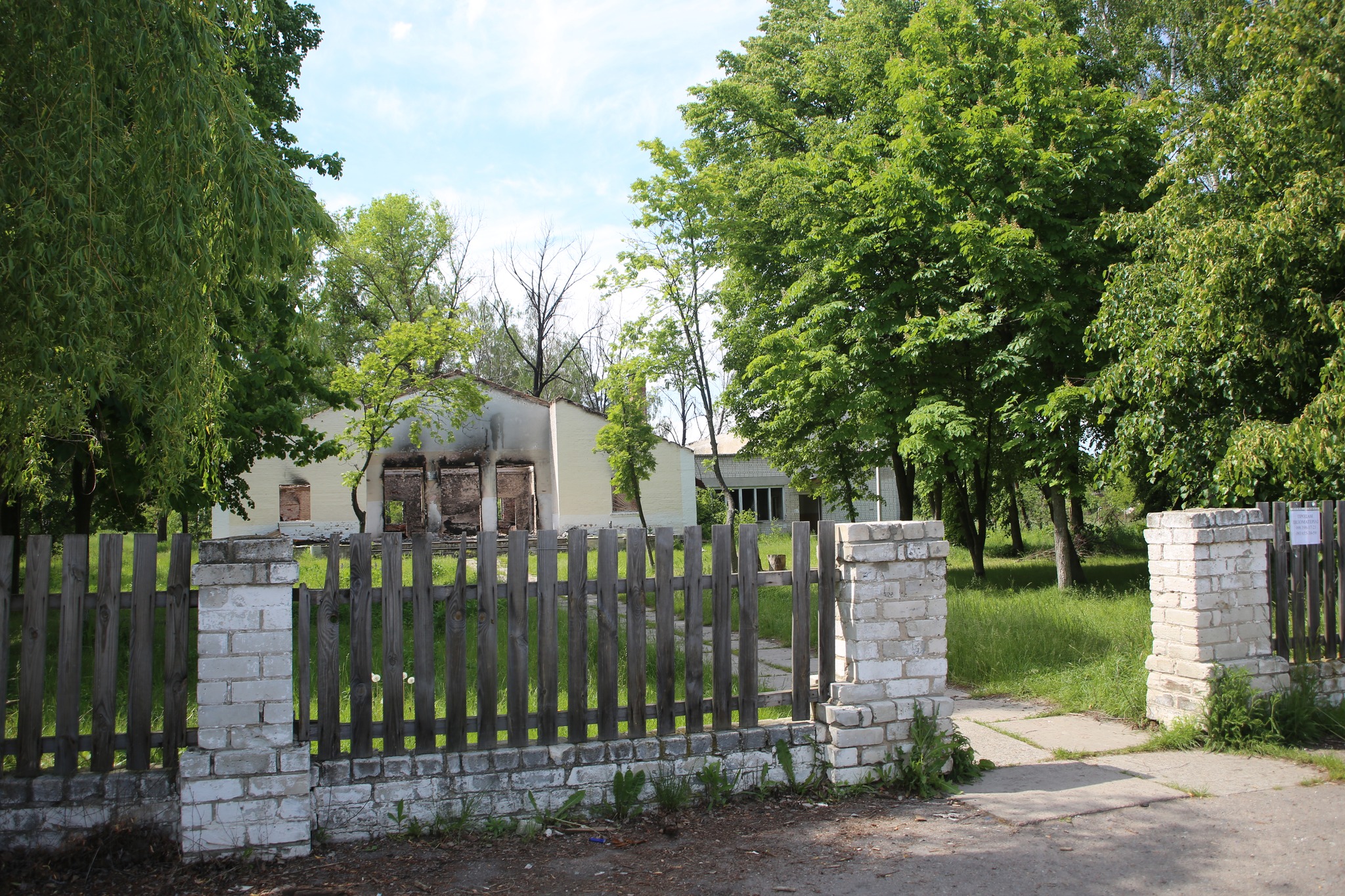
“The Tuvans are the worst,” Tamara said, referring to the remote Russian region bordering Mongolia, adding that sometimes they entered the basement and demanded, “give us a woman.” Tamara thinks the Russian special forces unit that held hostage villagers in the Yahidne school basement was “not as savage as the Tuvan people.”
“Some [Russian soldiers] were better, and some were worse, but I wish that none of them returned home (alive),” the woman said.
The day Russians retreated came unexpectedly. On 30 March, Russians closed people in the basement as usual, but they could hear a commotion and the movement of military equipment. Then there was silence until the Ukrainian soldiers arrived, and the people could finally go home, whoever still had a home.
Tamara’s 11-year-old granddaughter lost a lot of weight. The child was so terrified that her mother promptly took her away from the village. Tamara and her husband lost everything and are incredibly grateful to the volunteers providing aid to survivors. Their hopes of passing on the home they toiled over together to their children have been ruined. “We hope for victory. We believe there will be victory,” Tamara says.
“Dead cows lay everywhere.” Destroyed farm in the Lukashivka village
Seven kilometers to the northeast of Yahidne lies the village of Lukashivka. From there and the neighboring village of Ivanivka, the Russians shelled Chernihiv and its suburbs. In the summer of 2022, finding a single house in Lukashivka that has not been severely damaged or completely destroyed will be difficult. The evidence of Russian shelling of civilian homes is everywhere.
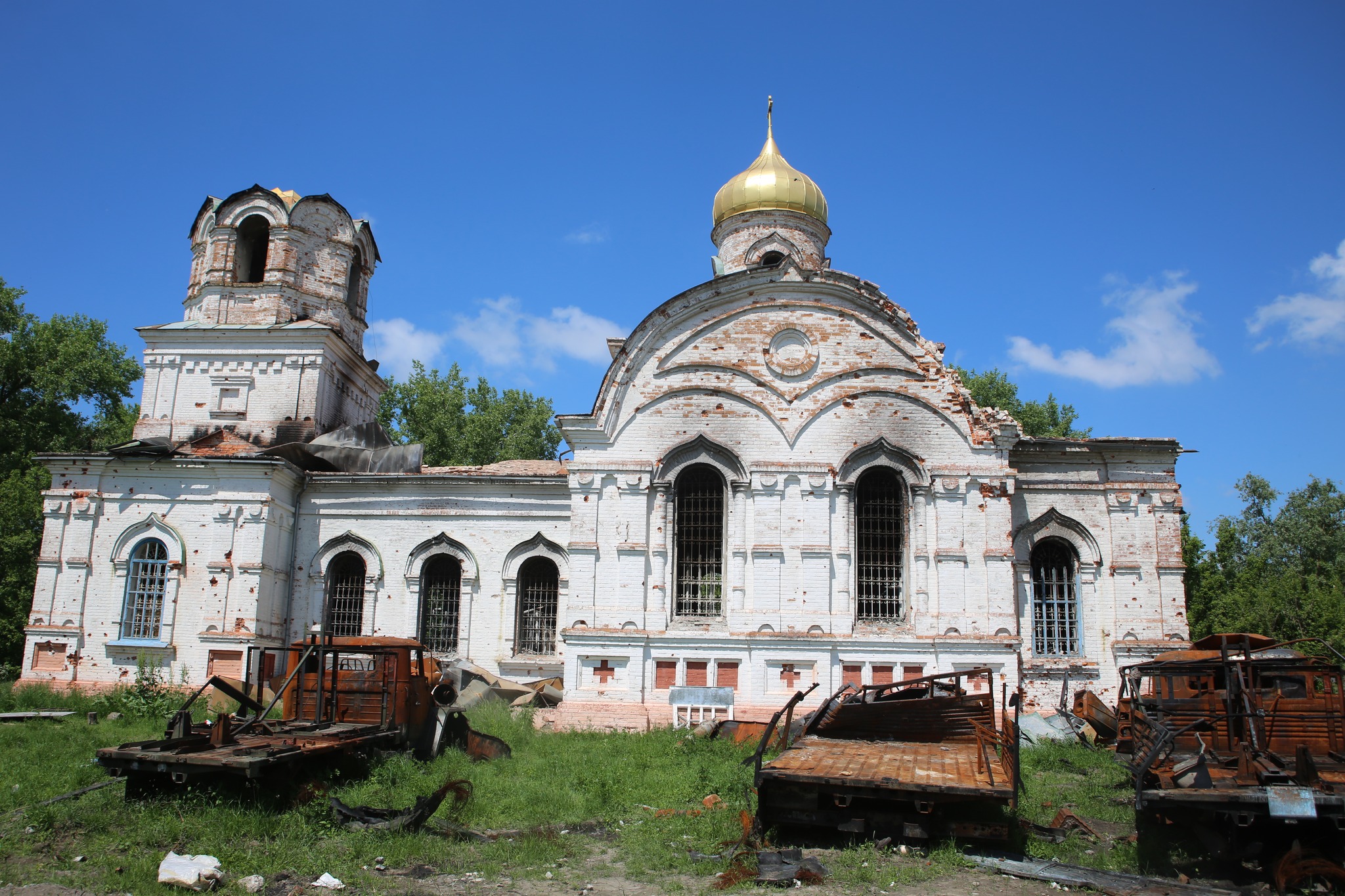
Yet not only private houses but businesses too suffered badly from Russian shelling. The shelling destroyed half of Alla Mykolayivna’s family farm during the month of Russian occupation in March. Villagers say that dozens of dead cows were lying all around the farm.
When Russians entered the village in the first days of March, Alla Mykolayivna and her son were not allowed to leave the cellar for three days. The Russians saw Ukrainian self-propelled guns stationed not far from their farm and discovered that the farmer had invited the territorial defense to the farm premises to sleep in the first days of March. The Russians started checking the documents of the farmers’ family, and one day they started interrogating Alla’s son.
“They took my son out for questioning, shot him over the head, cut his leg and tendons, and knocked out his teeth. They asked where our soldiers were… Other boys [from the villages] were also taken to the fields and interrogated,” Alla told us.
The family says they don’t know what to do with the business they have been building up for years. Out of 120 cows, only 63 remain. The shrapnel from the Russian bombardment of the farm killed the remaining cows.
“Wherever they [cows] were hit, there they lay. Some were injured but still alive and were lying and waiting for death. We also lost calves,” Anna recalls.
The woman says they still cannot sell milk because there is no electricity. The milk goes to waste.
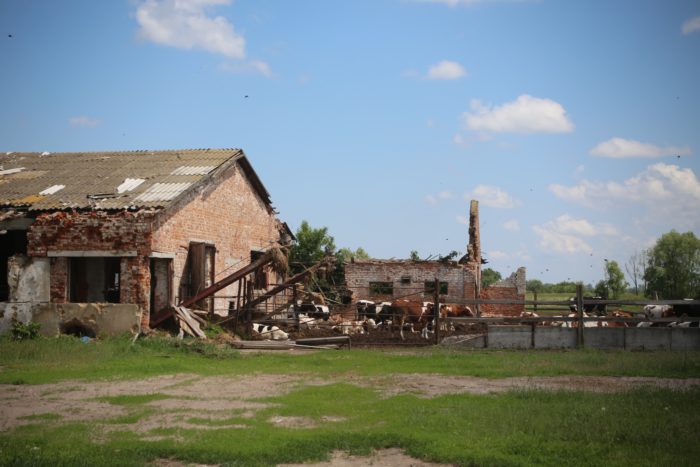
Anna says that she and her husband started the farm in 2001. They began with a horse and a cow. They bought land from people (after Soviet collective farms fell apart, each farmer was assigned a part of the land, and many sold it to make money because of hyperinflation,–ed.), and now the family has 400 hectares of their own, and rented land. Since Anna’s husband died three years ago, the children now continue their business.
We visited the destroyed farm together with Anna’s son-in-law, 37-year-old Andriy. Near the farm, we saw traces of battle – several destroyed armored personnel carriers and cars belonging to the Ukrainian military and Russian invaders. The shelling destroyed the granary, and there is a lot of scattered grain inside, which has sprouted in places. Cows used to eat here.
In the first days of the war, Anna and Andriy helped the Ukrainian military and invited them to sleep in the part of the barn where there was hay. The farmer made places for Ukrainian soldiers to sleep and helped them with food.
“The first time we were hit by [Russian] Grad rockets was 7 March. And then the Russians continued shelling with tanks. They shot at the vegetable storehouse and here at the granary.”
In the granary, there are traces of the artillery. In the rye, there are Russian Kamazes with shells near the storage. Russians were stationed here and in the village of Lukashivka from 9 March to 30 March, when the farm was seized from Ukrainian forces.
Among the rye field, many projectiles still fell from the Kamaz, but these were relatively safe. Deminers have destroyed the most dangerous projectiles. Yet deeper explosive materials may still be in the field, making it challenging to sew the fields. Nonetheless, the Ukrainian farmers were determined to complete the sowing this spring and plan the harvest.
Near the field, there is a car that is almost wholly burnt. Yet two soldiers are unscrewing something from it. Due to the lack of spare parts, many are taken from the battlefield, including from Russian equipment, because Ukraine and Russia still have a lot of similar equipment of Soviet heritage.
Russian mines, destruction, looting: Ukrainian farmers deal with aftermath of occupation
Russian war crimes in Ukraine: soldiers raped Chernihiv Oblast residents
Sometimes Tuva people came to the Yahidne school basement where locals were kept hostages, saying, “give us women,” Tamara from Yahidne village, who stayed in that basement, recalls. Tamara says that from what she saw, the Russians told Tuva soldiers to go away and did not give them women. Tamara believes that people in the Yahidne school basement were kept by the Russian special forces unit, who were less cruel.
Tuva soldiers were walking around Yahidne and nearby villages, and many locals told the same story that they were looking for women.
Volunteer Roman Movchan, throughout spring 2022, had been evacuating Chernihiv residents and bringing aid to the recently liberated villages. Roman experienced Russian war crimes while on his mission in Ukraine, and tells us about a family from Ivanivka which was taken to Yahidne village.
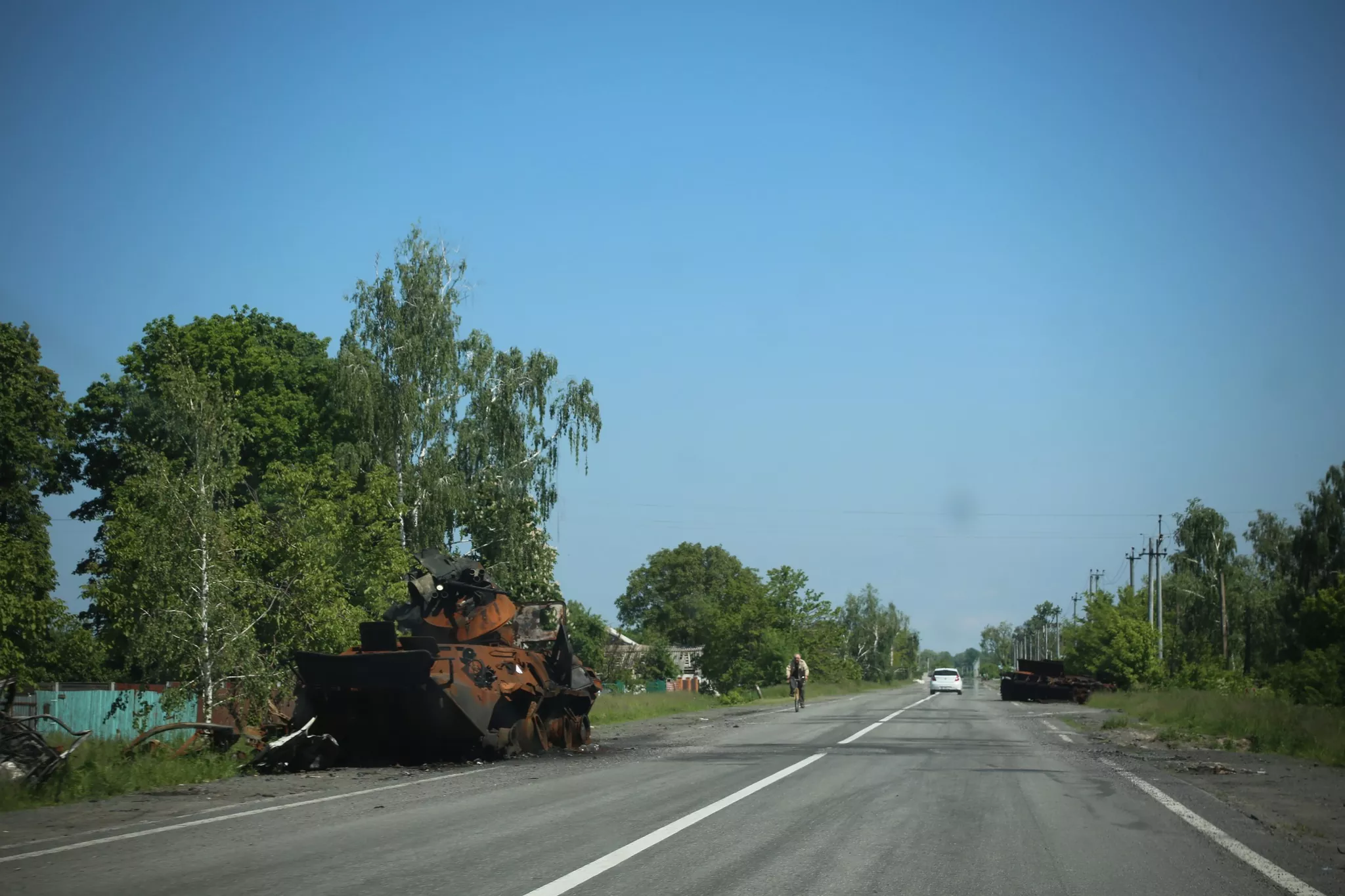
“They [Russian soldiers] got drunk, killed a man, and raped his wife. They are all the same type, these jerks don’t come up with anything new… We have heard many such stories in our Oblast. There are countless cases of girl abductions. I am certain that Russians have moved many girls from Ivanivka to Yahidne, where they committed the atrocities. If the Russians took the girls, then for what, definitely not for a romantic evening by candlelight…Then people started to hide the girls. There are a few remote homesteads near Ivanivka and they started to hide the girls there,” Roman says.
The buildup of Russian war crimes in Chernihiv Oblast, Ukraine
The behavior during occupation depended on what people from Russia were in a particular unit: from looking for vodka and robbing to frying chickens with feathers.
While driving in Chernihiv Oblast, we saw more checkpoints than near Kyiv. Every ten kilometers, there is a checkpoint where documents and cars are checked. Destroyed houses, burned-out military vehicles, and remnants of projectiles recall that fierce fighting was only very recently here in the Oblast.
Volunteer Roman Movchan was one of the first to arrive in the villages recently liberated by Ukrainian forces in early April. Roman says that Russians didn’t commit serious crimes in the first few days of the attack. They believed locals would greet them as liberators:
“They did not touch anyone in those villages that they passed first from the border, they were in a good mood there, and still went to the shops to buy cigarettes. They were on their way to a parade. More than 1,500 units of military equipment passed in that direction towards Chernihiv, where the Ukrainian military started crushing them.”
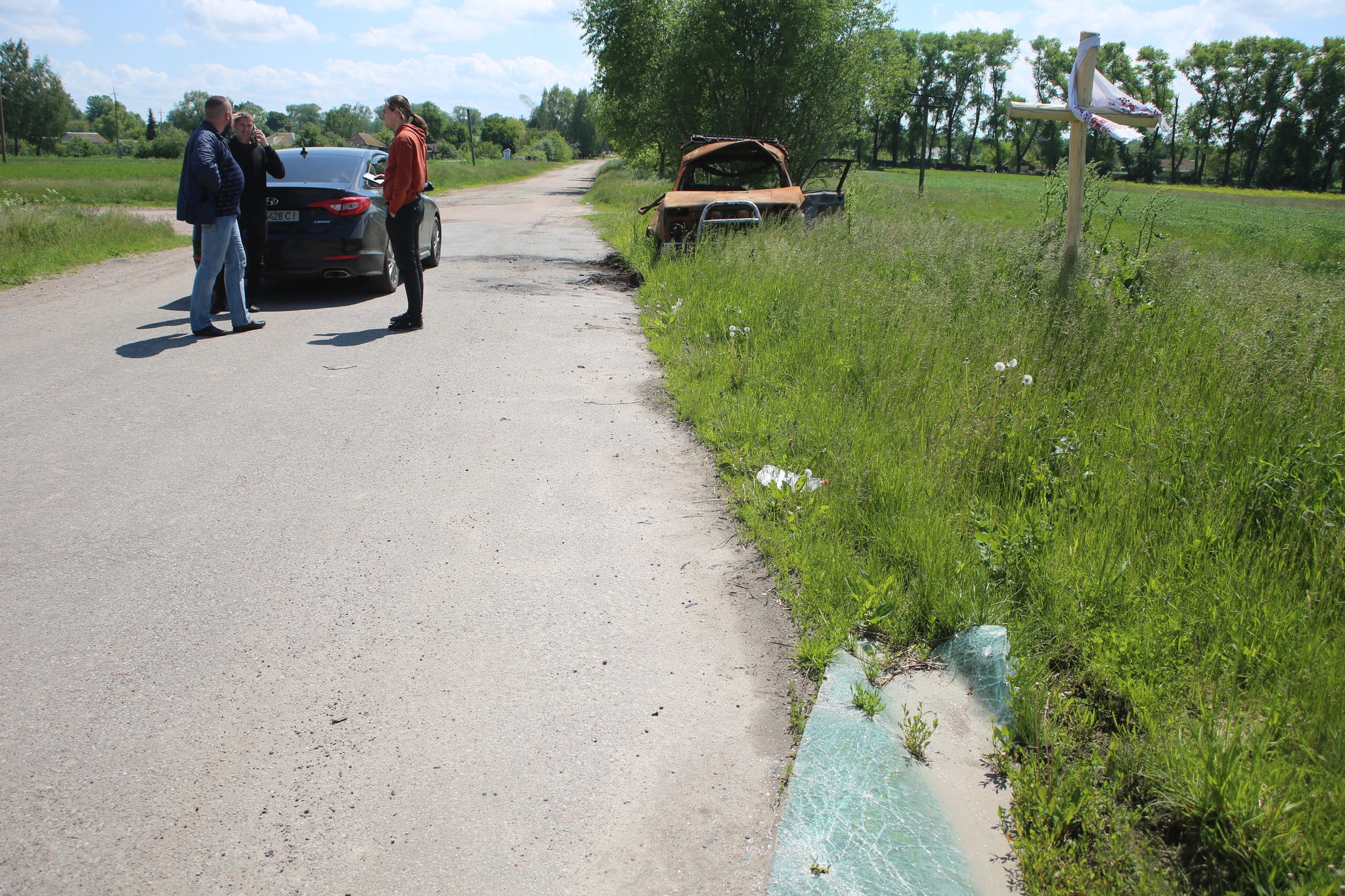
When the Russian occupation reached the outskirts of Chernihiv, where Roman lived at the time, he witnessed a lot of cars shelled by the Russians. They also bombed Roman’s minivan and a minibus that his group of volunteers used to evacuate survivors – one of the Russian war crimes that were repeatedly observed in Ukraine.
“There were 19 passengers in that bus and I remember 9 of them died. People were running away and many cars were shelled and burning on the roadsides.
There were also cases in Ivanivka of people asking the Russians during the occupation if they could leave the village. Russians told people that they could go, then shot up the car from behind.”
The number of shelled vehicles in the area south of Chernihiv is astonishing. In June 2022, when many cars had already been taken away, we still saw them every few kilometers while driving through the villages.
Cars that exploded on mines or were destroyed due to Russian shelling in villages southwest of Chernihiv in February-March 2022. Photos by Orysia Hrudka
[VIDEO of killed girl by Oleksandr]Yuriy Mykolayovych, 55, from Lukashivka, told us that the Russian soldiers took away his dog.
“A drunken officer came to me and started shooting. He said that if he found something, I would be a corpse. ‘What do you have in your cellar?’ he asked. I showed that there was nothing. And then he asked what was in the second and third cellar and I showed that there was nothing but potatoes and fodder. And all the time he held a machine gun pointed at me.
Then this officer heard a shepherd’s voice. He asked what kind of dog it was, and then said that he would take the dog. On the second day, the dog came here again herself, but then the soldier came again and said that he would be taking the dog away. I asked why he needed it and he said that he dreamed of getting such a dog for two years. He took the dog and that was it, we never saw her again.”
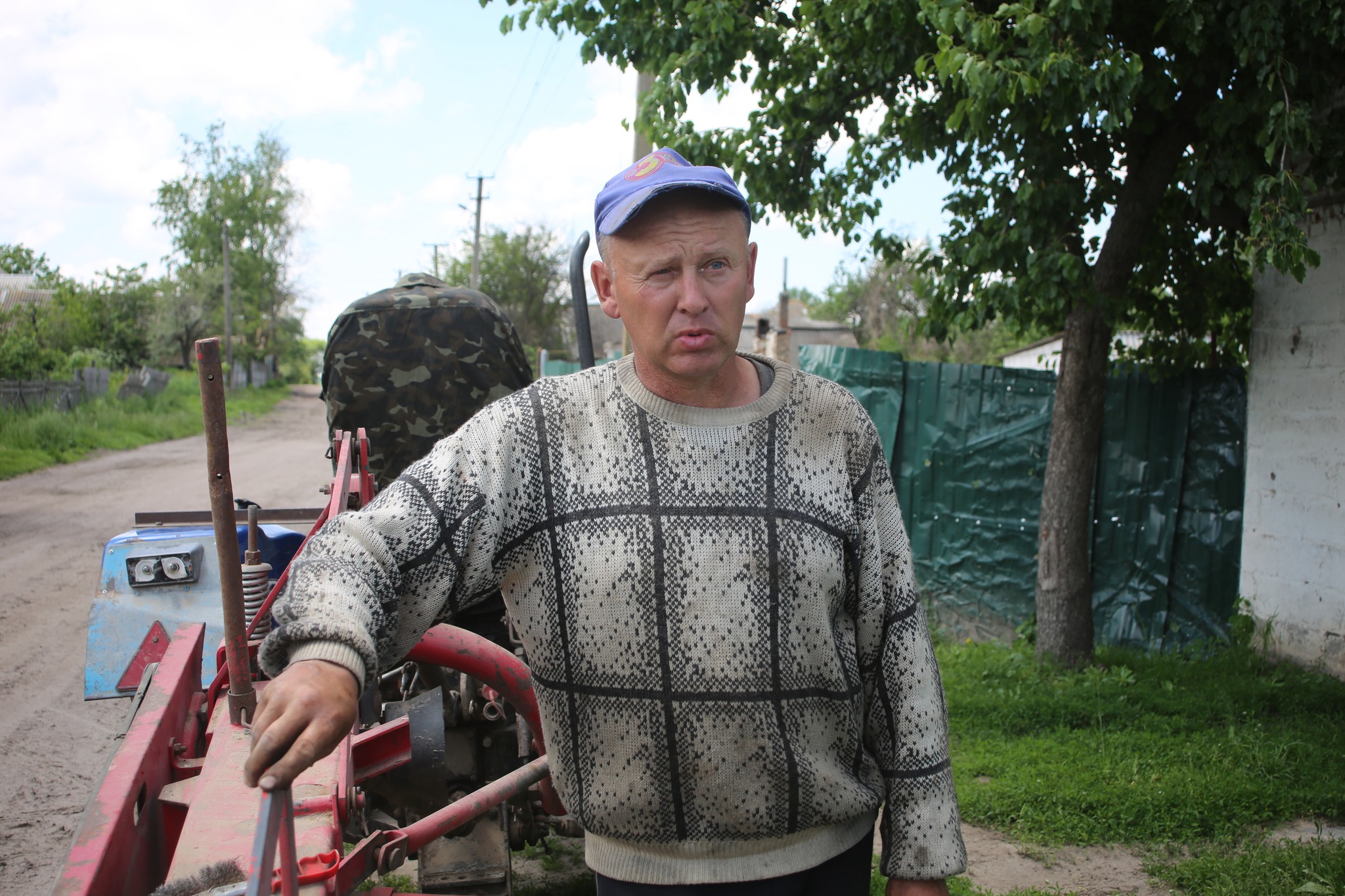
Local people say everything depended on the particular unit of the Russian army. Roman recalls the story of his friends from Viktorivka, also under occupation. Their family was sitting in the house when the door flew out, broken by feet. Russians came in and asked: “Is anyone alive? If not, we open fire all over the house.”
“Well, we are alive,” people come out.
“Do you have any weapons or relatives from the military? Show the documents,” Russians then asked.
“Here are no weapons, and neither do we have relatives.”
“Do you have vodka?” the next question was.
“Yes.”
“Give it!”
They gave but not everything the first time.
“Is there something to eat?”
“Yes.”
“Give it!”
“Well, you understand, if you were made to kneel under a machine gun, then no matter what kind of patriot you are, you will give food or vodka,” Roman comments.
Then Russians said to the people in the house, “We are leaving, but we will come back. If not us, then others from our unit. You are corpses if any of you close the gate or the door. We will shoot without hesitation.”
So, people opened the door and sat in the house. Already at night, other Russians would come:
“Is somebody alive?” And again, they asked for alcohol and food.
“Those friends of mine were not robbed, but their neighbors, who left their homes, were robbed,” Roman recalls. “The next day, still more came, asking if there was alcohol. My friends said that they had already given everything. Ok, then, those Russians said and left. Everyone says with one voice that those who are still similar to the Slavs, because it is a big question to what extent Russians are Slavs, those from the west of Russia show at least some adequacy. But those from the East, of Asian appearance, were generally savage.”
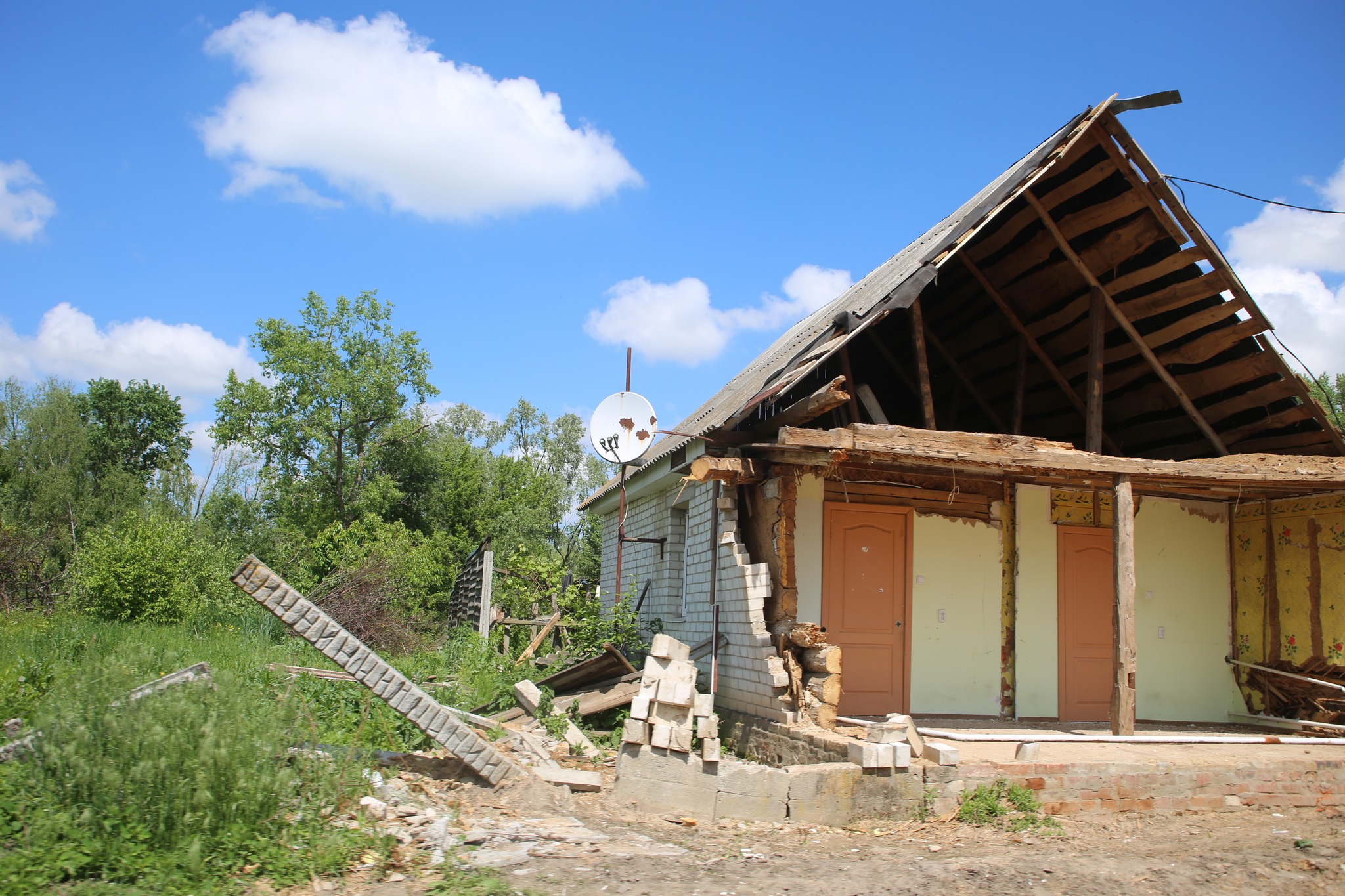
Once people of Asian appearance, likely from Tuva, saw the henhouse, Roman said. They first checked the people’s house and then took the family out, pointed at the henhouse, and asked:
“Who lives in that house?”
“It’s not a house. It’s a henhouse.”
“Do you think we are stupid!” shouted Tuvans. “Open it.”
The owner opened it. Then a soldier threw a grenade there. After that, they ran inside with machine guns and saw there were chickens. Russian soldiers beat the local villagers for living too well because people put chickens in the “house.”
“When they lived in Lukashivka, they ate chickens there without cleaning their feathers. They take a chicken, cut it up, turn its skin inside out, fry it on the fire and eat it. All the chickens were eaten like this.
Those people from Russia robbed electric kettles but without the bottom part that is plugged into the electricity socket. Once they also took a man’s powerbank and beat the man until he said that it was a specific phone from NATO.”
Related:
- Whoever could, fled the Russians. We went back to Irpin to save the rest
- Created in three days, Ukraine’s territorial defense ruined Russian plans to capture Kyiv
- “They were shot in the back of the head.” Eyewitness account of Russia’s murders of Bucha residents
- Ukraine’s secret to resisting Russia: resilience
- Bucha: a turning point–not only in Putin’s war in Ukraine, but in relations between Moscow and the world
- Lviv Garrison Church chaplains help soldiers find God amid war. And a pair of good boots
- Ukrainian theology professor turned sniper tells how to hunt for Russian invaders
- I am a researcher, not a military man. But there is war…
- “Dearest daughter, it’s total Hell. Death is everywhere” – Ukrainian father on the frontline
- Russian occupiers launch war on Ukrainian history, burning books and destroying archives
- The Russian invasion of Ukraine is an assault on the very concept of freedom
- From retiree to millionaire: 7 stories of heroism during the war in…

